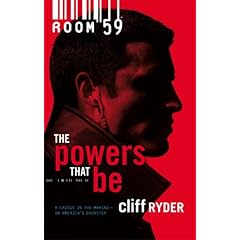Room 59: The Powers That Be by Cliff Ryder
Publisher: Gold Eagle (January 8, 2008)
ISBN-10: 0373632657
ISBN-13: 978-0373632657
Room 59 is a multinational covert ops organization that specializes in doing the things that nations cannot do. The members are culled from various military, police and spy organizations and are trained to be the ultimate in deniable operatives. They are equipped with the very latest in high tech gear and can get support from just about any government organization. To top off all this, there is little interference or micromanagement from the countries involved.
Room 59 takes on the hard jobs that nobody in an official government military or intelligence capacity can do. They use small hard hitting teams that can do anything, including kill, to accomplish the mission. That is their mantra, the mission comes first.
So what happens when a top operative of Room 59 gets involved with an operation where he has a personal agenda? An agenda that nobody else in Room 59 knows about?
Room 59: The Powers That Be places Jonas, a former member of the German GSG9 special operations group into that situation. Jonas is tasked to keep an rogue organization from assassinating Raul Castro, Fidel Castro's brother. A powerful Cuban-American businessman wants Castro dead and the revolution in Cuba finally ended and he is willing to do anything to accomplish this goal. He sets up a mercenary group to invade Cuba and remove the current power structure. But first he must have Raul Castro exterminated.
The powers that be, though, do not want this. It is a common belief that if Castro falls, then the tiny island nation will be thrown into more civil war and chaos that will happen if the Cuban communists fall slowly apart under their own power. Room 59 is tasked with the mission to stop the assassination.
Jonas is placed in charge of the mission. But he has his own reason for getting involved because he has been to Cuba before and has ties to the chosen assassin.
The action is great. I enjoyed the plot and characters immensely. The author has no problem killing off characters, even important ones. He holds true to the mantra, mission first--everybody is expendable. I like this as it is a truism in military circles, people get wounded and killed. Nobody is so good as to be bulletproof. It also pays homage to an old military cliche, "no plan survives contact with the enemy." The plot twists and turns were good. Once I started reading I could not put it down.
I will admit I had a bit of a problem with the Gee-Whiz high tech gear. Some of the gear was too over the top and was not very believable. Kind of like some of the Bond gadgets. But that is my only complaint and a not very big one at that.








